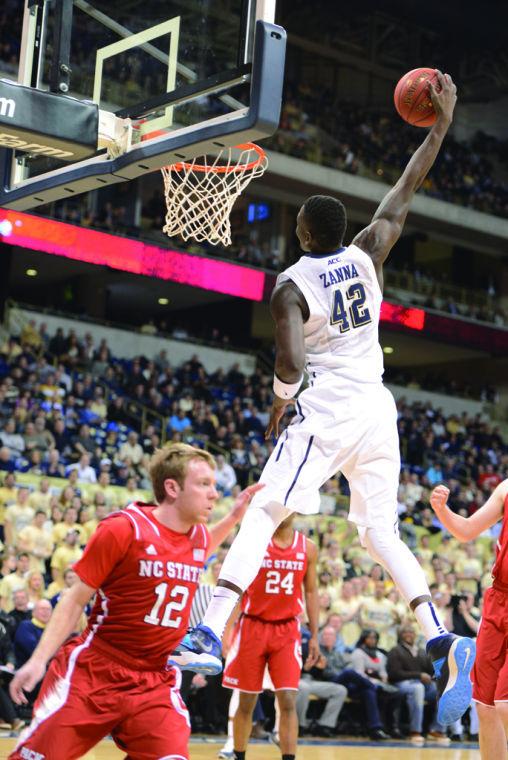Men’s Basketball: Rebounding woes doom Panthers in home loss
March 4, 2014
N.C. State guard T.J. Warren set a Petersen Events Center record with his 41 points Monday night. But as impressive as the ACC’s leading scorer was, he wasn’t the only reason Pitt lost its third-straight home contest when North Carolina State beat the Panthers at their own game.
While Warren was scoring at will, the rest of the Wolfpack were dominating the Panthers on the glass. Pitt (22-8, 10-7 ACC) finished on the wrong end of a 35-23 rebounding margin, and the Panthers ultimately lost 74-67 in their final home game of the season.
With one game remaining for his team in the regular season on Saturday at Clemson, head coach Jamie Dixon maintained that rebounding is the common theme in all eight of his team’s losses.
“When we’ve come up short, that’s always been the thing that stands out to me,” Dixon said.
And opposite Warren’s record-setting night, the Panthers tied one of their own — Pitt’s 23 rebounds tie for the lowest single-game total by a Dixon-coached team, after Pitt recorded only 23 rebounds in a victory against Georgetown Jan. 13, 2007.
The rebounding total — especially on the offensive glass — left Pitt’s head coach stunned.
“I don’t know how we can get two offensive rebounds,” Dixon said.
North Carolina State head coach Mark Gottfried echoed Dixon’s sentiments, calling Pitt’s offensive rebounding totals “almost unheard of” with a Dixon-coached unit.
Dixon’s disbelief in Pitt’s rebounding numbers is supported by the record books — Pitt’s total of two offensive rebounds set a school-record for the lowest single-game total.
N.C. State’s rebounding helped to compensate for the Panthers’ superior shooting Monday, similar to the way Pitt found a way to defeat Notre Dame Saturday despite the Fighting Irish out-shooting them for most of the game.
Senior center Talib Zanna said Pitt’s use of a zone defense contributed to the Wolfpack (18-12, 8-9 ACC) reeling in 13 offensive rebounds.
“It’s easy to get a rebound [against a] zone,” Zanna said. “We just didn’t block out. We didn’t do the right things. I guess that’s what we get.”
Pitt finished at an even 50 percent from the field for the second consecutive game. The Panthers shot out to an early double-digit lead, which peaked at 13 points late in the first half, shooting 59.1 percent on 13 of 22 field goals in the game’s first 20 minutes.
But even with a 36-31 halftime lead, Dixon wasn’t comfortable.
“We were making shots, but we weren’t out-rebounding them, and we knew that,” Dixon said. “Eventually that stuff catches up to you.”
He was right.
Pitt’s hot shooting cooled considerably in the second half, when the Panthers scored just 31 points on eight field goals in the second half. Gottfried said there wasn’t a difference in his team’s defensive strategy from one half to the next, but that the Wolfpack just got better in the second half.
That strategy focused on Pitt’s own perimeter scoring threat: forward Lamar Patterson.
“We tried to full-front Patterson, just completely deny him the ball,” Gottfried said. “We did a much better job of helping each other.”
As a result of the defensive effort, especially on the interior, N.C. State prevented Pitt from crashing the offensive glass.
“We protected the paint better than we did a couple of nights ago, and I think that helped us get in better position to rebound the ball,” Gottfried said.
With the loss, the Panthers finished their home schedule with a 4-5 record in conference play. Pitt’s loss came in the final home game for seniors Zanna and Patterson.
“It came down to rebounding,” Patterson said. “Between that and Warren going off, that’s a recipe for a loss right there.”








